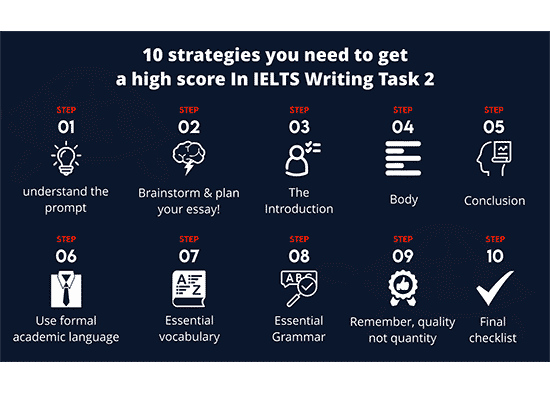
10 strategies you need to get a high score in IELTS Writing Task 2
Do you want to get a great score in your Academic IELTS Writing Task 2 test?
Perhaps you need a band 6 or even a band 7 or 8 in writing?
Well, one of the most feared modules in the IELTS test is Writing Task 2.
Preparing for IELTS Writing Task 2 can be overwhelming. It feels like there’s too much to write in too little time.
You have to brainstorm ideas and structure your essay. You have to use the right topic vocabulary and linking words. Of course, make sure not to forget to use perfect grammar…
And on top of that, you have to make sure that you use academic writing style….all of this within 40 minutes! Are you kidding me???
Sometimes, it feels like climbing Mount Everest would be easier than doing the IELTS Writing Task 2!!!
But don’t worry, our IELTS course is here to help you.
So in this article, we help you navigate the highest IELTS mountain in the world by giving you the tips and tricks and strategies that you need to succeed in IELTS Writing Task 2.
Alright, get your hiking boots on and waterproof jacket…coz it’s time for us to scale IELTS Mount Everest

1. Read the question and understand the prompt
The first stage of climbing IELTS Mount Everest is base camp. This is where you prepare yourself for the journey ahead. You need to read the question, understand the prompt and identify exactly what will be expected of you.
Hint: So many test takers fail this module because they don’t read the question properly
Keep in mind that Writing Task 2 generally has 1-3 part questions, as can be seen in this table below:
| Question | How many parts? | What is being asked? |
| To what extent do you agree or disagree with this statement? | 1-part question | Whether you agree or disagree and your reasons for it |
| Discuss both views and give your own opinion | 3-part questions | Discuss view #1 and view #2 and present your stance |
| Do the disadvantages of x outweigh the advantages? | 2-part questions | Clearly identify whether you think the disadvantages outweigh the advantages and give reasons why |
| Why is this so? What effect does it have on the individual and society? | 3-part questions | Address the reasons and discuss the effect it has on both the individual and society |
Here’s an example of a 3 part question:
“Nowadays, the way many people interact with each other has changed because of technology. In what ways has technology affected the types of relationships people make? Has this become a positive or negative development?”
The prompt has 3 parts:
Part A: Nowadays, the way many people interact with each other has changed because of technology (this is the introduction of the topic)
Part B: In what ways has technology affected the types of relationships people make? (You have to answer this question with explanation and relevant examples)
Part C: Has this become a positive or negative development?” (Clearly identify your stance here, whether you think the impact is positive, negative, both? Don’t forget to explain your reason! :)
Here’s an example of a 2 part question:
“Many people think that the government should not restrict what people say in public media as it is part of freedom of speech. To what extent do you agree to this statement?”
The prompt has two parts:
Part A: Many people think that the government should not restrict what people say in public media as it is part of freedom of speech.
Part B: To what extent do you agree to this statement?
Make sure to cover all parts in your answer.
2. Brainstorm and plan your essay!
Here we go…this is the most difficult part of the whole journey. You will have to cross a glacier of ice. This is a dangerous stage…it’s treacherous….if not done properly, you can fall off the ladder into an ice cave…many people get stuck here…and some even die…
Test takers HATE brainstorming and coming up with ideas.
And indeed, it takes a lot of practice to develop the brainstorming and planning skills.
Hint: It’s a big mistake to skip this part and just try to wing your answer. These types of answers are usually a mess and examiners hate reading unstructured essays.
An outline helps you organize your thoughts and save time. Making an outline helps you identify exactly what you want to write. Write about 4-5 paragraphs, with a formula like this:
- Introduction (to the topic and your thesis statement)
- Body paragraph 1 (main idea #1 + explanation)
- Body paragraph 2 (main idea #2 + explanation)
- Body paragraph 3 (main idea #3 + explanation) this one is optional
- Conclusion
Remember: a plan needs to be written, checked, and later followed.
3. The Introduction
The next stage is Camp 1 in the Valley of Silence. This is where avalanches can occur and wipe you off your path, so you better make sure you have firm footing.
Two main things you need to do in the introduction paragraph:
- Introduce the topic of your essay. (Remember: You can’t simply copy paste the topic rubric, you must rephrase it and use your own words.)
- Answer the question. (This is your thesis statement. Without this, you’re not responding to the task and your score is reduced.)
The introduction is where you set the tone for the rest of the essay so make sure your sentences are clear.
4. Body
The next stage is Camp 3, the Lhotse Wall. This is where you spend the most energy. The hike is tough and the temperature is killing you! But the top is near and the view is rewarding! Tighten up your gear, and let’s keep moving…
Now, you have your plan and that’s your navigation tool. As long as you stick to the plan, all you have to focus on now is the technicalities: grammar, word choice, spelling and punctuation.
Here are some guidelines:
- Each paragraph should start with a main idea or topic sentence
For example: “To begin with, technology has changed the way people communicate…” (then continue by giving your reasons and examples) - Use linking words to guide the reader along your train of thought.
For example: To begin with, on the other hand, to conclude, moreover…
- Explain each point and if possible, give examples so that the reader will see the relevance of your point.
5. Conclusion
This is the dreaded death zone. You’re getting higher and the air is getting thinner. You are reaching the summit and the views are going to be amazing. But you have to watch out because oxygen is running low and you might just run out of time…
There are three things you need to do in the conclusion:
- You can start with one of these phrases: “In conclusion, To summarize, To conclude..” (don’t use “all in all” though because it’s too informal)
- Revisit the question and make sure that you clearly answer it in the conclusion. You can simply rewrite your thesis sentence in a different way.
- Add your hope or suggestion (of how things should be) or fear (your reservations, if any). However, make it simple and don’t write things that need further explanation.
Other things to consider
6. Use formal academic language
IELTS is used to assess your ability to write in Academic English. Therefore, you must write in a formal way. To do that, you should:
- Avoid contractions: use “do not” or “will not” instead of “don’t” and “won’t”
- Avoid ‘spoken’ language: use “I am going to” or “I want to” instead of “I am gonna” or “I wanna”
- Avoid an informal writing style. This is an academic essay and it should be formal. So, don’t write subjectively or use too personalized examples.
7. Essential vocabulary for IELTS Writing Task 2
There are many linking words that you can use to connect your sentences, here are some examples:
- Addition: moreover, furthermore, in addition to, additionally, on top of that
- Comparison: however, in contrast, by comparison, whereas, on the other hand
- Condition: provided that, as long as
- Result: as a result, consequently, accordingly, therefore, for that reason
- Conclusion: hence, thus, therefore, to conclude, to summarize, overall
8. Essential Grammar for IELTS Writing Task 2
It is essential to use a wide variety of grammar to show you have perfect command of the English grammar. For example, make sure not to simply use simple sentences like:
In schools, students learn to analyse literature. They learn to calculate using trigonometry. And they learn how photosynthesis works. However, often students are inexperienced after graduation. They are also helpless when they encounter the real world.
Try to use complex sentences:
In schools, students learn to analyse literature, calculate using trigonometry and understand how photosynthesis works, but often students are inexperienced and helpless after graduation when encountering the real world.
9. Remember that IELTS writing is about quality, not quantity
Perhaps you have heard that IELTS writing task 2 should be 250 words long. This is the minimum so DO NOT go under. However, do not go above 300 words either as the examiner might not read your final paragraph.
You should be able to clearly present your essay in under 300 words. There is no need to over-complicate your essay. Too few or too many words are signs of bad planning.
10. Final checklist
To ensure you’ve done all the requirements and ensure your essay is as good as it can be, it is useful to make a mental checklist (or even a physical one on your question sheet).
Some things to include in your checklist are:
- Have I answered ALL parts of the question?
- Have I written at least 250 words?
- Does it progress clearly? Can the examiner follow my essay with ease?
- Have I supported my ideas with relevant examples?
- Have I written an introduction and conclusion? Are they clear?
- Did I punctuate correctly?
SUMMARY:
Congratulations. You have reached the summit of IELTS Writing Task 2. What a great view you have from the top.
And you didn’t even fall to your death!
If you would like to climb Mount Kilimanjaro, otherwise known as IELTS Writing Task 1, check out our article on Tips and Tricks for Writing Task 1 right here.
If you found this article helpful, please share it with someone who you feel would benefit.
And if you have any comments or questions, please don’t hesitate to put them in the comment section below! We promise to reply!
Do you want to achieve your IELTS target?
We just shared the tips and strategies you need to ace IELTS writing task 2. Armed with these strategies, you can take the first step on the road to achieve your dream IELTS score.
But if you want to guarantee success in your IELTS test…
And
You’re tired of wasting time and money on strategies and courses that don’t work…
And
You’re confused on which IELTS course to take….
Indonesia’s best IELTS preparation course
Check out our IELTS preparation course to achieve your target IELTS score and embark on the next chapter of your life!
IELC has the best track record in Indonesia for helping our students achieve their IELTS target and we will use our experience and expertise to make sure you will achieve your target too!
P.S. If you are curious about your IELTS score, contact us about our simulation tests complete with feedback for writing and speaking test!
Sincerely,
Anthony McCormick
IELC Managing Director
If you like this article, you might want to check out:
